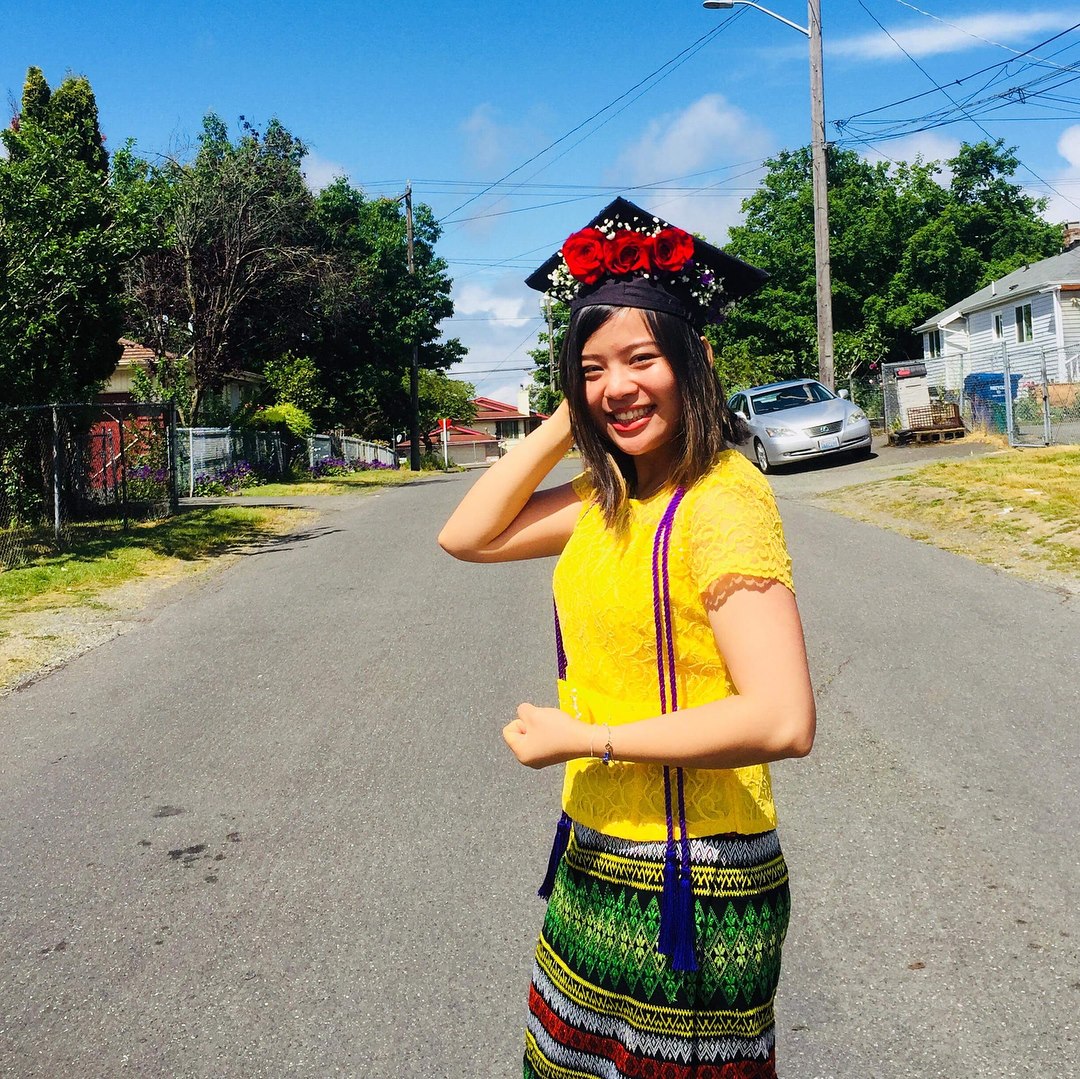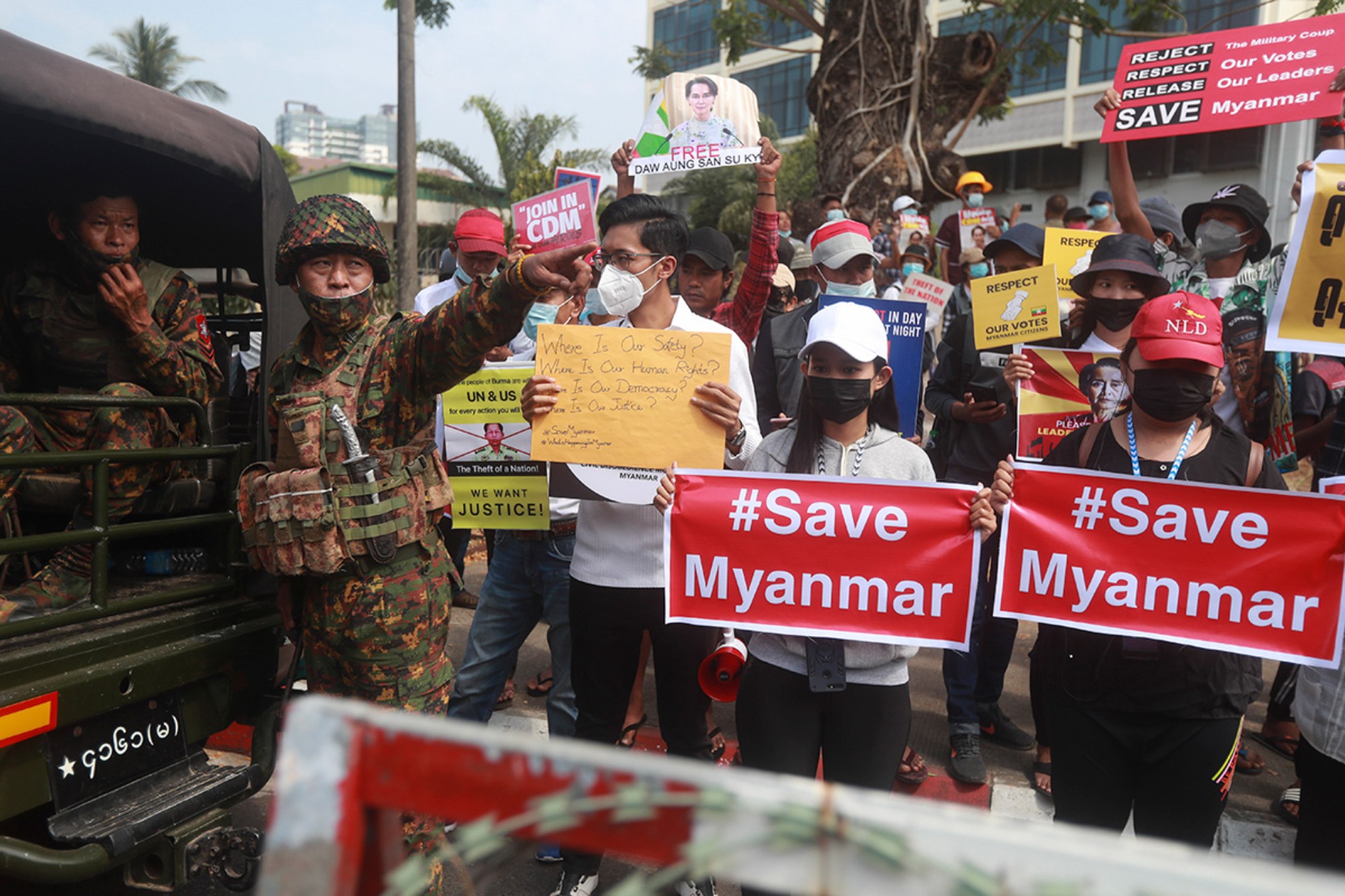By Thu Thu May Oo
“Shh!! Papa! They might hear you!” I whispered to my dad, but he kept chanting “We want democracy! We want democracy!” as we drove our ancient motorbike on the outskirts of my hometown.
I was only five years old, but I still remember vividly the fear I had of the “people in uniform.” While I may not have understood much, I knew that “democracy” was not a term we could readily use.
I grew up in a small town called Mawlamyine in southeastern Myanmar (known as Burma during the British colonial era), surrounded by mountain ranges covered with velvet green forests. We had a small garden where we grew rambutan, papaya, coconut, Thai chilies, water spinach, drumstick (moringa) and pennywort, my dogs’ favorite snack. We felt content with our life. Well, we had to. Growing up in a military dictatorship, surrounded by poverty and ethnic conflicts, I learned to be grateful for the things I had, and to give back to others who were more underserved than we were. And there were many: Every evening, listening to the BBC and Voice of America Radio channels in the flickering candlelight, our family heard news of prisoners and the civil wars between the military government and the ethnic minorities. Every day, we dreamed of the day when we no longer would have to survive under the military regime.

IN HAPPIER TIMES Thu Thu May Oo, a master’s degree student in TC’s Program in Nutrition Education, has lived through successive eras of protest in Myanmar. (Photo courtesy of Thu Thu May Oo)
My first personal encounter of a civil movement in Myanmar was the 2007 Saffron Revolution. I was 14 years old, living with my grandpa in Yangon, the regional capital, when protests erupted at the corner of my street and all over the country. Because of economic crises triggered by a sudden rise in fuel prices, people could no longer afford to eat or buy necessities. Peaceful demonstrations led by students, political activists and Buddhist monks quickly turned to bloodshed when the military soldiers started beating civilians and attacking with tear gas. Some protestors were arrested while others were massacred. I remember seeing people holding hands tightly and chanting as the soldiers cracked down on their gatherings. Darkness followed as the electricity was cut off and curfews were imposed. There was no access to international news channels. The only way to connect to the outside world was, once again, by listening in secret to the radio.
The undermining of democracy and freedom in my country are textbook examples of how authoritarianism accomplishes its aims.
Thankfully, those years passed and life in our country improved. In 2011, the people elected Aung San Suu Kyi, the 1991 Nobel Peace Prize recipient and leader of the National League for Democracy party (NLD), as the first State Counsellor of Myanmar. To be sure, democracy was still tenuous: The 2008 constitution, written by the military government, empowered the military itself, not the people. The Ministry of Defense continued to oversee the Ministry of Home Affairs and the Ministry of Police, while also holding the government’s executive, legislative and judicial powers. These same leaders perpetrated wars against ethnic minorities, including the genocide of the Rohingya community in Western Myanmar.
Still, in 2020, in our second democratic election, Aung San Suu Kyi and NLD won with more than 80 percent of the vote against the opposition party backed by military personnel. It truly seemed as though Myanmar might be turning the page on its past.
The shattering of Myanmar’s fragile democracy has once again destroyed the hopes and dreams of families like mine. My heart aches as I think of my mom, who in 1988 was a second-year nursing student...She cleansed the blood from the wounds of the protestors. I know she is painfully reliving that moment.
And then, on February 1st, 2021, my mom called me in the middle of the afternoon, U.S. time. In a trembling voice, she told me that the Myanmar military had staged a coup. That day, the military had declared the November 2020 results fraudulent and detained the elected officials — along with civil activists, authors, artists and monks — before they could be sworn in at Parliament. Despite the fair election, the military has since declared a state of emergency for one year, during which the country will be controlled by the commander-in-chief, Min Aung Hlaing. Tanks and soldiers have flooded the street of our capitol, Nay Pyi Daw, and internet and phone services have been disrupted. Facebook has been shut down and it has been announced that Twitter and Instagram will also be blocked. Even worse, there has been a delay in COVID-19 vaccinations as the military has prevented shipments from India.
Of course, I share this story because the shattering of Myanmar’s fragile democracy has once again destroyed the hopes and dreams of families like mine. My heart aches as I think of my mom, who in 1988 was a second-year nursing student on her night shift at the hospital in Mawlamyine when the military soldiers cracked down on a student rally. She cleansed the blood from the wounds of the protestors. I know she is painfully reliving that moment. My siblings and friends and I are the embodiment of her sacrifices and of the pain that our parents and grandparents endured to win access to education, healthcare services and economic stability, and to secure the future of our country and our generation.
Our country is far away from the United States, and its history and culture may seem very different. But as you read the headlines about what is happening there, remember that our fight is your fight.
But I also write these words because, as Dr. Martin Luther King said, “Injustice anywhere is a threat to justice everywhere.” The undermining of democracy and freedom in my country are textbook examples of how authoritarianism accomplishes its aims. How far are is the world going to let this continue? From the Black Lives Matter movement to farmers’ protests in India, we are seeing sociopolitical movements arise on social media wherever human rights are being violated. In the name of democracy and freedom, we need people everywhere to take up the cause of Myanmar’s people.
Our country is far away from the United States, and its history and culture may seem very different. But as you read the headlines about what is happening there, remember that our fight is your fight — because as recent history has shown, in many countries, even the hardest-won gains can be undone.
Thu Thu May Oo is a master’s degree student in Teachers College’s Program in Nutrition.
